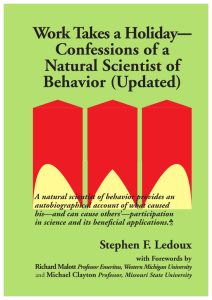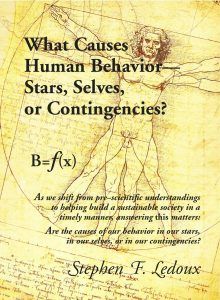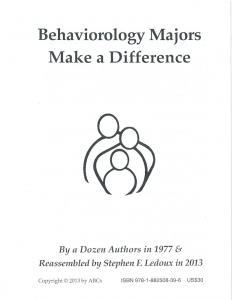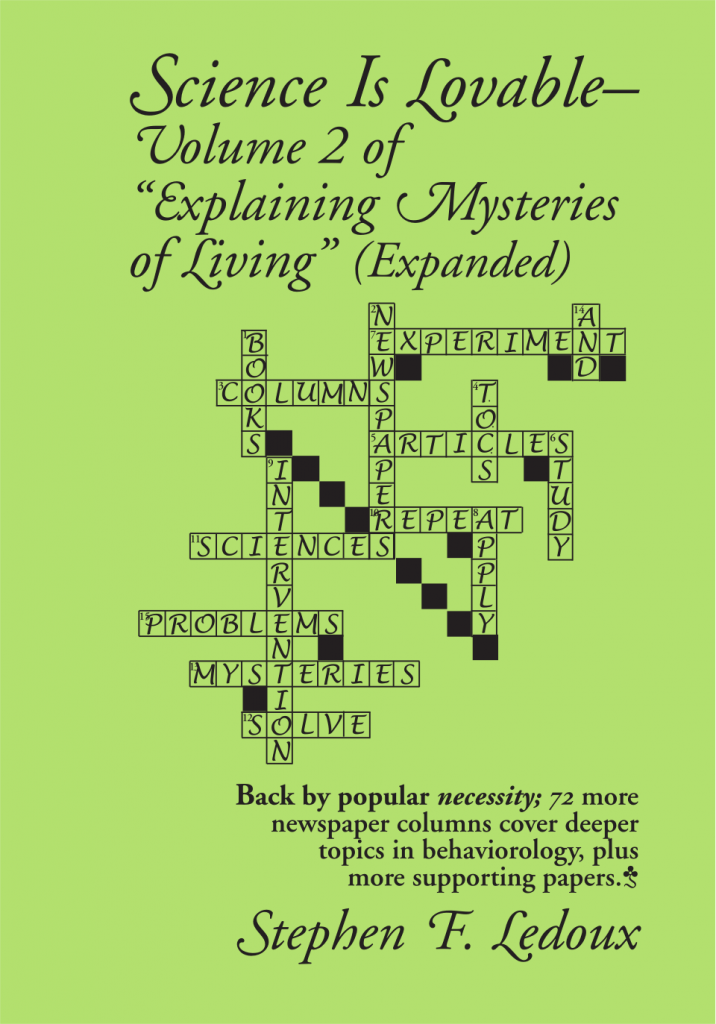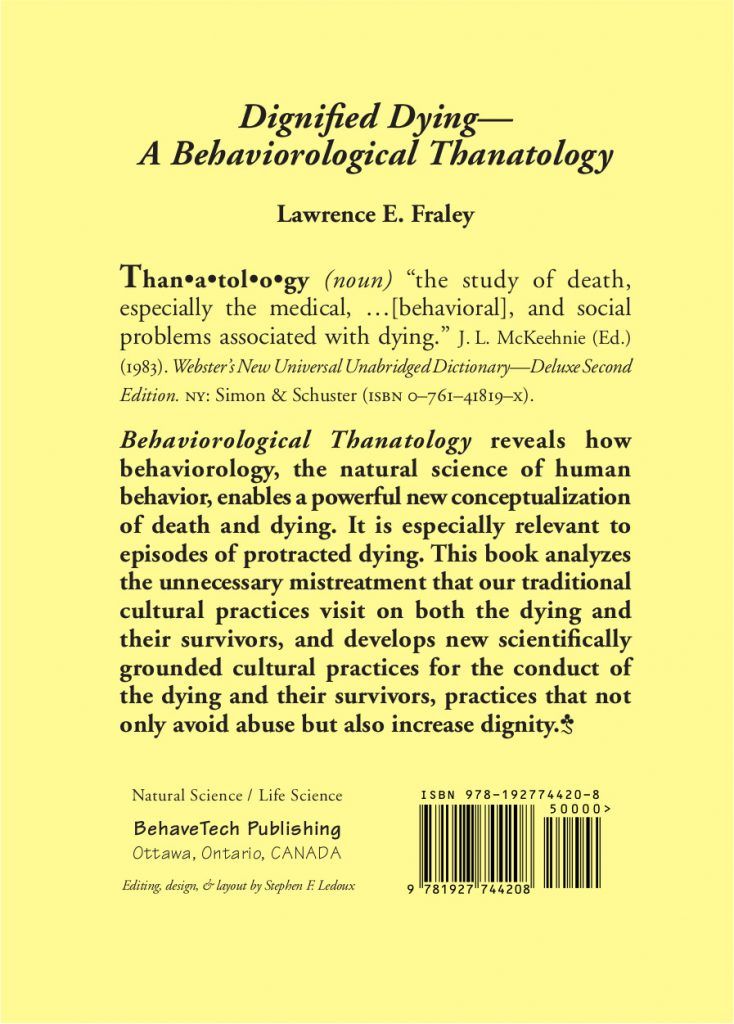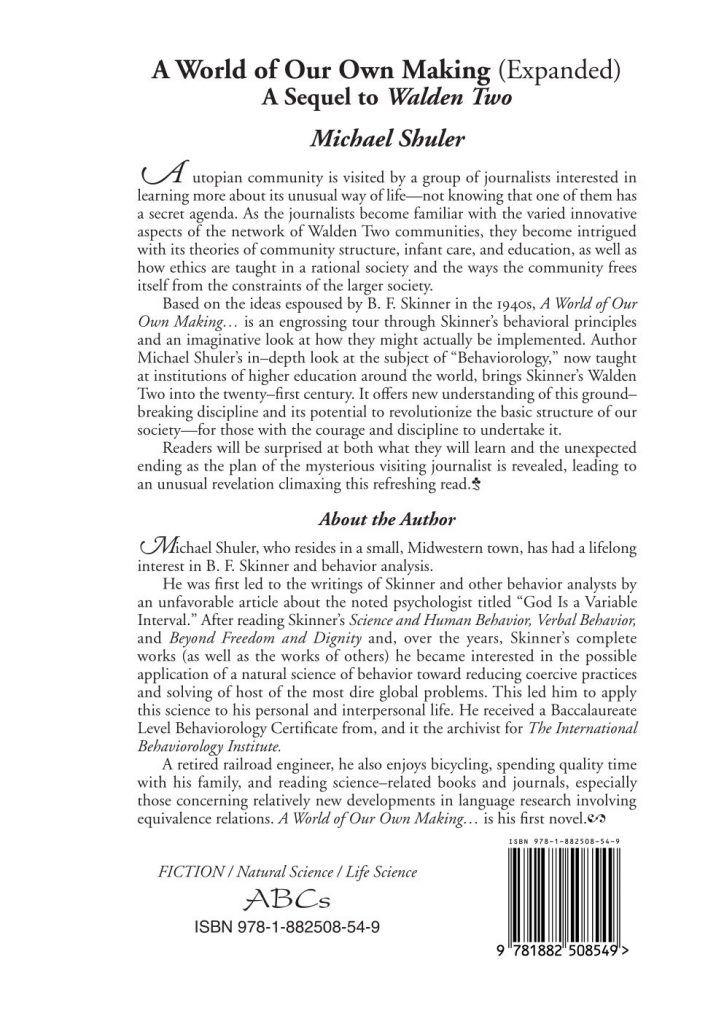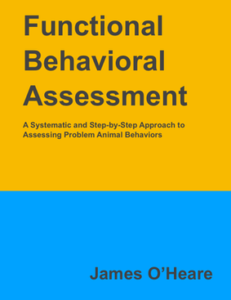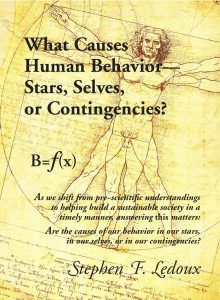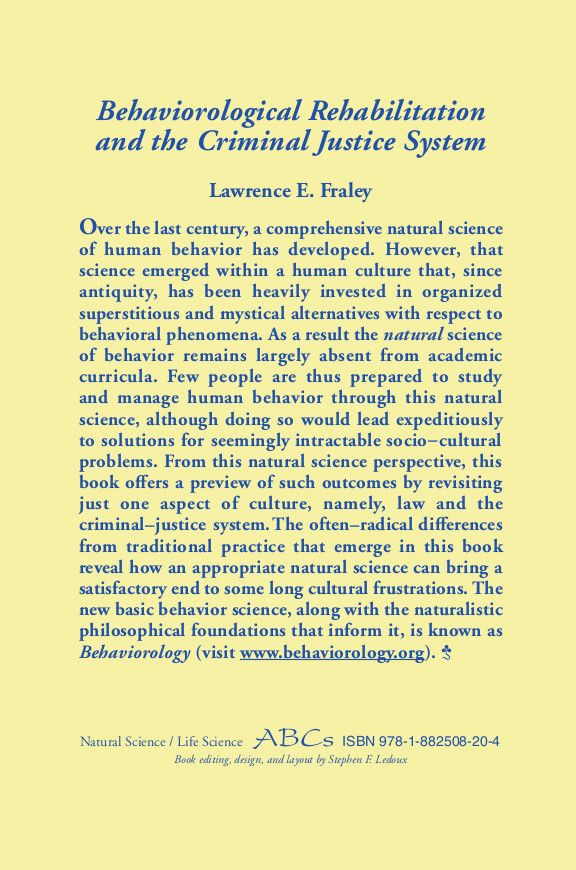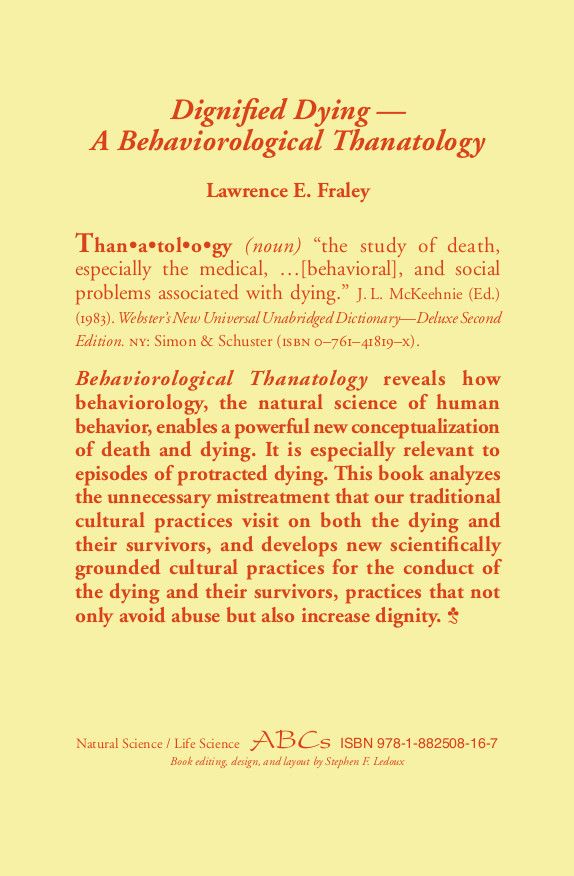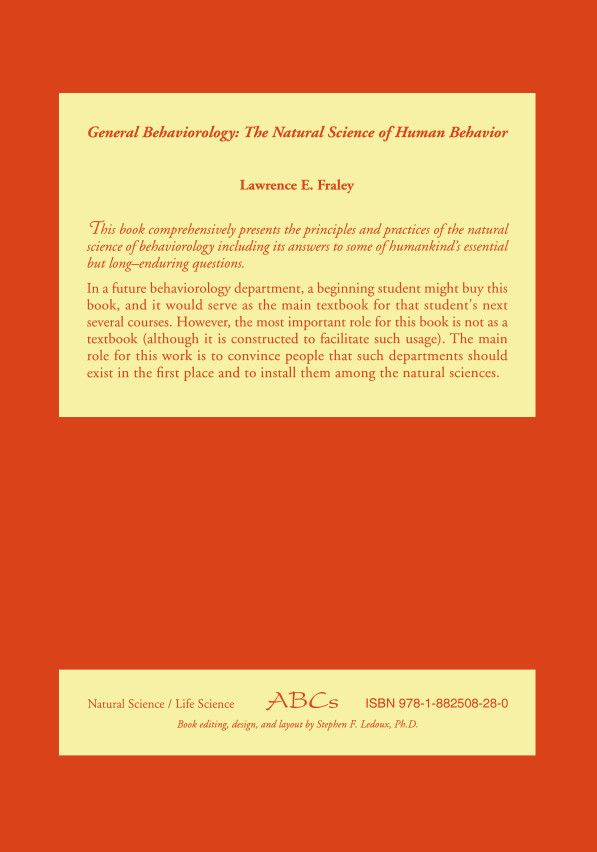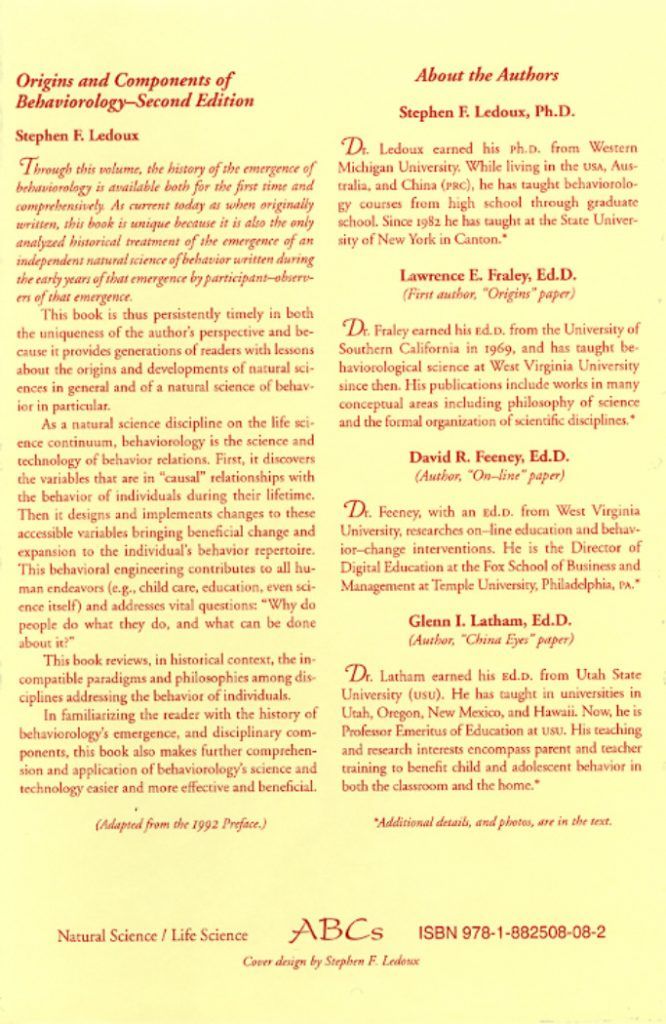The description of each book includes information on at least one source from whom you can order copies, usually using a distributor’s phone number or website. If such options do not apply, or do not work for you, then you can use this BOOK ORDER FORM. Alternatively, email the author of the book you want, or one of the members of the TIBI Board, under CONTACT.
NOTE: Visitors to this website hardly need reminding that natural scientists of behavior, like all natural scientists, are behaving organisms like everyone else, with behaviors—scientific and otherwise—under the same natural laws of behavior that govern the behavior of all living organisms. These complex laws can produce behavior repertoires with sometimes vastly different, and even contradictory, responses across individuals. Thus, no surprise should occur when the expressions of written viewpoints by different individuals on various topics show a range of similarities and differences. And of course their viewpoints need not conform entirely to the official views of TIBI, the non–profit professional organization that sponsors this website. Furthermore, since like science, art is also behavior, various contingencies also induce some natural scientists of behavior to include art in their activities. This inclusion can occur either as an artistic endeavor or as a scientific endeavor, or both.
BOOKS BY COVER
LIST OF BOOKS
- Less–Traveled Roads—Circumstances that Produced Natural Scientists of Behavior (2022)
- Curious Visual Fun—Photo Arts from a Scientist (2023)
- Animal Rights (2022)
- Work Takes a Holiday—Confessions of a Natural Scientist of Behavior (Updated) (2024)
- Some Intersections of Science, Coercion, Equality, Justice, and Politics—A Teapot Tempest Stirs Sciences (2021)
- Science Is Lovable—Volume 2 of Explaining Mysteries of Living (Expanded) (2021)
- Explaining Mysteries of Living Expanded (2021)
- Dignified Dying—A Behaviorological Thanatology (soft cover edition 2020)
- A World of Our Own Making (Expanded) A Sequel to Walden Two (2021)
- About Science, Life, and Reality (2019)
- Behaviorological Rehabilitation and the Criminal Justice System (soft cover edition 2019)
- Solving Dog Behavior Problems Like a Professional (2019)
- Functional Behavior Assessment…Animal Behavior (2019)
- Empowerment Training… (2019)
- Science Works on Human Behavior (2018)
- Resolving Fears, Phobias, and Anxieties: An errorless Differential Reinforcement Approach [A Manual for Professionals] (2018)
- Resolving Fears, Phobias, and Anxieties: A Guide for Dog Guardians (2018)
- What Causes Human Behavior—Stars, Selves, or Contingencies? (2017)
- Beautiful Sights and Sensations—Small Collections of Native American and Other Arts (2016)
- Origins and Components of Behaviorology—Third Edition (2015)
- An Introduction to Verbal Behavior—Second Edition (2014)
- Running Out of Time—Introducing Behaviorology to Help Solve Global Problems (2014)
- Behaviorology Majors Make a Difference (2013)
- The Science and Technology of Dog Training 2nd Edition (2017)
- Aggressive Behavior in Dogs: A Comprehensive Technical Manual 3rd Edition (2017)
- Training Dogs—A Dog–Owner’s Guide to the Science of Behavior and Non–Coercive Dog Training (2017)
- Problem Animal Behavior—Functional Assessment and Constructive Contingency Management Planning (2016)
- The Science and Technology of Animal Training (2014)
- Behaviorological Rehabilitation and the Criminal Justice System (2013)
- Dignified Dying – A Behaviorological Thanatology (2012)
- General Behaviorology – The Natural Science of Human Behavior (2008)
- Grandpa Fred’s Baby Tender OR Why and How we Built our Aircribs (1987)
- Origins and Components of Behaviorology – Second Edition (2002)
- The Panda and Monkey King Christmas—A Family’s Year in China (1997)
- Study Question Books
- Bookmarks
Less–Traveled Roads—Circumstances that Produced Natural Scientists of Behavior
Table of Contents and More Information (PDF)
For several years now, contingencies of many kinds have gradually provided various reasons to produce a book, or series of volumes—each about 200 pages— wherein different natural–scientist–of–behavior authors tell their life stories. This first such volume features the stories that five natural scientists of behavior have contributed. These are “short” (i.e., up to 40 page long) chapters in this book of autobiographies titled Less–Traveled Roads—Circumstances that Produced Natural Scientists of Behavior. Professor Thomas Critchfield, of Illinois State University in Normal, contributed the Foreword.
This book reports the circumstances that contributed to the repertoires, products, and outcomes of each author’s life. Such circumstances are really the contingencies (i.e., the functional relations between the mostly environmental independent–variable “causes” and the behavior dependent–variable “effects”) that led to the conditioning of the authors’ repertoires, and the products resulting from the repertoires, across each author’s lifespan. Thus these autobiographies stress the contingency—not agency—accounts for each author’s contributions in teaching, research, and service across their career. The five authors featured here are Stephen Ledoux, Michael Shuler, Lawrence Fraley, Zuilma Gabriela Sigurðardóttir, and Michael Clayton.
The value and drama of science also come across through these life stories, including the possibility of a new grammar, one that by design provides more support for science, especially natural behavior science. This support, which these authors engage to different extents, occurs by reducing reliance on the personal pronouns, especially “I.” In our culture such pronouns too easily, and falsely, imply an existence to some inner agents that theological and secular superstitious views purport to be responsible for human behavior. These pronouns are best treated (i.e., reacted to) as verbal shortcuts for longer, inconvenient, but more accurate phrases like “DNA–based carbon–unit locus of contingency effects.” (Aren’t verbal shortcuts nice?)
Another volume of such autobiographies is possible. Are you a natural scientist of behavior (e.g., behavior analyst, behaviorologist, BCBA)? Are you interested in contributing? Contact these books’ editor, Stephen Ledoux, for details by writing him at 26 Timber Ridge Road, Los Alamos NM 87544.
This 196–page, 2022 book (published by ABCs of Los Alamos, NM) is available, with a list price of $19, through “Print–On–Demand” at www.lulu.com (find it by entering the editor’s name).
Whether interested in this science, its practitioners, its history, or all of these, check out this book.
For more details, click the “Table of Contents and More Information (PDF)” link, above.
Curious Visual Fun—Photo Arts from a Scientist
Table of Contents and More Information (PDF)
This 126–page book—which the publisher, ABCs, of Los Alamos, NM, released early for 2023—displays an extensive selection of the composed photographic arts that the author, Stephen Ledoux, accumulated across his lifespan. Most of these compositions, however, occurred between the years 1975 and 2000, after which science writing took increasingly more of his time and energy than did photography.
Providing context for the images, the introduction chapter summarizes the photography–related descriptions of life events and circumstances originally presented in more detail in the author’s autobiography (Work Takes a Holiday— Confessions of a Natural Scientist of Behavior, which the publisher, ABCs, released in 2022 on www.lulu. com). The photographs appear across nine chapters—generally one filling each page—broadly organized by topic (e.g., seasons, sunsets, structures, balloons, plants, Amish quilts, and window–frost photos, including a photo that looks like it could represent some alien life forms). Other “introduction” topics range from early photography developments, through balancing science and art, to more details about some of the various photo categories.
Importantly, the book early on includes a discussion of the definition of “art.” In this case the definition is enhanced by the author’s career life as a Professor of Behaviorology, the natural science of human behavior, the discipline that studies why behavior happens (and which is not a part of, nor any kind of, “psychology”).
The author’s definition of art states that, scientifically, art is the novel products of, and the conditioned production of, responding induced by a wide range of environment–behavior contingencies (i.e., connections between “causal” environmental and genetic independent variables and the dependent variables of “effects” on behaviors) in an equally wide range of media, that may or may not produce reinforcing effects from its uses (i.e., its functions) but that indeed produce emotionally reinforcing effects, for others as well as the artist, that typically evoke the human verbal response of “beautiful.” The term “reinforcing effects,” in this context refers to effects that make the art–production responses and art–appreciation responses occur again later under similar evocative conditions.
For more details, click the “Table of Contents and More Information (PDF)” link, above.
For a short biography of the author, click HERE.
Animal Rights
Table of Contents and More Information (PDF)
Animal Rights provides a focused contribution to the serious literature relevant to comprehending and extending a scientific take on rights. Through the publisher, the author provides this background:
Rights are the protection of interests. The most fundamental right is the prohibition against coercive exploitation: not to be treated as property, not to be caused pain and suffering. Who ought this basic right apply to? All and only humans? That does not really specify what it is that qualifies them. Being really smart? Being capable of language? These criteria would rule out a number of humans, and why are these criteria relevant to who is eligible for basic rights? All and only sentient beings have one fundamental interest in common: to avoid/escape pain and to continue living to experience pleasure. This includes all humans but it also includes a great many other animals. In the Western world, we believe strongly in liberty, rights, and justice. If we are to be just, we must admit that a great many animals are eligible for basic rights. Just as sexism, racism, and heterosexism are unjust (because sex, race and sexual orientation are irrelevant to the function of basic rights), so too is speciesism. I will argue in Animal Rights: Liberty and Justice for All that justice demands that all sentient beings, not just the ones who happen to be human, are eligible for basic rights, given all of the deeply held beliefs we have in individual liberty, rights, and justice.
This 86–page, 2022 book (published by Tellwell Talent, Canada) is available worldwide in all major online book stores in softcover (ISBN 978-0-2288-7597-0) and hardcover (ISBN 978-0-2288-7596-3) and ebook (ISBN 978-0-2288-7595-6) formats.
Readers with any interest in the questions of rights in general, or animal rights in particular, should not miss this book.
For more details, click the “Table of Contents and More Information (PDF)” link, above.
For a short biography of the author, click HERE.
Work Takes a Holiday—Confessions of a Natural Scientist of Behavior (Updated)
Table of Contents and More Information (PDF)
Several natural scientists of behavior contributed to a book of “short” (i.e., up to 40 page) autobiographies (see the book, Less–Traveled Roads—Circumstances that Produced Natural Scientists of Behavior). However, after contributing a chapter to that book, its editor found that he still had many more memories and materials that remained relevant to his story, so he continued writing and wove all these into a fully analyzed and documented autobiography focused on the contingencies that affected the directions, drama, and products of his life. After the publisher released this book (and a “Reduced” edition, which is still available), the author uncovered many more documents, papers, and pictures that previous reliance on memory had not turned up. These were incorporated into the full story, along with several online resources. (Due to pandemic–caused delays for some chapter manuscripts in the Less–Traveled Roads… book, this full, single–author autobiography actually got released first in 2022, and then got “updated” for release as this larger edition in 2024.)
As a result of uncovering so many more materials, this autobiography’s title became Work Takes a Holiday—Confessions of a Natural Scientist of Behavior (Updated). Released just before 2024, this book reveals what caused the author’s—and can cause others’—participation in science and its beneficial applications.
This book reports the circumstances that contributed to the repertoires, products, and outcomes of the author’s life. Such circumstances are really the contingencies (i.e., the functional relations between the mostly environmental independent–variable “causes” and the behavior dependent–variable “effects”) that led to the conditioning of the author’s repertoires, and the products resulting from the repertoires, across the author’s lifespan.
Thus this scientifically accurate autobiography describes the contingency—not agency—origins of the directions and products across the author’s lifespan. It discusses some notable causes—causes that can apply to anyone—of his research, teaching, writing, and service across his career and contributions. Thus his story also conveys some of the value and drama of science.
For example, in this book the author accounts for his lack of use of the personal pronoun “I” by introducing the possibility of a new grammar, one that by design provides more support for science, especially natural behavior science, by reducing reliance on the personal pronouns, especially “I”. In our culture these pronouns too easily imply superstitious inner agents purportedly responsible for behavior, and such superstitious accounts interfere with the dissemination of the behaviorological science and interventions that humanity requires now to help solve the many human–behavior–caused global problems that threaten the survival of humans and the rest of the biosphere. As the author says, these pronouns are best treated (i.e., reacted to) as verbal shortcuts for longer, inconvenient, but more accurate phrases like “DNA–based carbon–unit locus of contingency effects”—Aren’t verbal shortcuts nice?—and he provides several examples across his pages.
All that shows some of the possibilities that can lead readers to greater understanding of this science and how they too can contribute to bettering the world, perhaps even as natural scientists of behavior.
This over 500–page book contains about 200 pages of explicit autobiography in 10 chapters, with the rest filled with two Forewords (one by Professor Emeritus Richard Malott of Western Michigan University in Kalamazoo and the other by Professor Michael Clayton of Missouri State University in Springfield), a full table of contents, several of the author’s papers, a bibliography, a list of documents and pictures, an index, and various other meaningful documents, photos, graphics, and appendices. ABCs of Los Alamos, NM, published this book, and it is available, with a list price of $49, through “Print–On–Demand” at www.lulu.com (find it by entering the author’s name).
Whether interested in the science, its practitioners, its history, or all of these, check out this book. You have a stake in the kinds of contingencies that this book discusses. So get your copy of the book, and share its possibilities with your friends, colleagues, and others.
(A “Reduced” Edition of the earlier version of this book is also available [on www.lulu.com]. It leaves out the author’s recent vita, as not all readers entertain an interest in the level of detail that a vita contains. Given this book’s format, leaving the vita out saved over 70 pages. This also, of course, reduced the book’s costs and so reduced its price. You can enjoy either this “Reduced” Edition or the recent “Updated” Edition.)
For the few copies of the original (i.e., not “updated”) 2022 edition printed prior to September 2022 (i.e., with the line on page iv, for the “Improved printing number,” that ends in “0”) the publisher has provided a short errata sheet. Click HERE for this sheet.
For more details, click the “Table of Contents and More Information (PDF)” link, above.
Some Intersections of Science, Coercion, Equality, Justice, and Politics—A Teapot Tempest Stirs Sciences (2021)
Table of Contents and More Information (PDF)
Several science–oriented authors have created a book on more of the connections between science and politics. Some historically repetitious and tragic developments occurred in the summer of 2020 (e.g., the police murder of George Floyd) and these prompted some serious and controversial discussions among some of the members of TIBI, some of whom saw a need for the natural science of behavior, that they call behaviorology, to stand up against the use of coercion in society, where coercion, they say, supports the divisiveness that is hurting society so much.
While that science did not invent coercion, it has done the experimental research to discover how it works, what problems it causes, and what some alternatives can be. Those points were part of a brief “Open Letter” that was one outcome of those discussions. A related outcome led to a book about the connections between science and politics, connections that occur in more ways that may previously have been entertained.
In that 200–page, 2021 book, after an Introduction chapter, that “Open Letter” leads to eight more chapters, by six different authors relating to the book’s topic as stated in its title, Some Intersections of Science, Coercion, Equality, Justice, and Politics—A Teapot Tempest Stirs Sciences. The “Contributing Organizers” (rather than “editors”) for the book are Stephen Ledoux and James O’Heare, and the book was published by ABCs of Los Alamos, NM. It is available, with a list price of $19, through “Print–On–Demand” at www.lulu.com (click the magnifying glass icon and enter the first organizer’s name to get to the book).
Here are the authors and their chapter titles:
- Open Letter Addressing Coercive Practices—by some of its signers
- An Overview of the Reinforcers–Values–Rights–Ethics–and Morals Continuum—Stephen Ledoux
- The Law of Cumulative Complexity Reduces Old and New Misunderstandings [with a potential impact on increasing equality]—Stephen Ledoux
- Why the Delays in Advancing the Natural Science of Behavior—Lawrence Fraley
- A Personal Response to a Tempest Too Small—Nia Barnett
- Some Natural Science Stands Inherently Political—Stephen Ledoux
- Racism, Politics, and Behaviorology—Michael Shuler
- Beyond GDP: Promoting Cultural Values as Reinforcers in the United States to Foster a Well–Being Economy—Dawn Kutza
- Sentient–Being Rights—James O’Heare
- Some Quotations Related to Science and Politics —by various authors
For more details, click the “Table of Contents and More Information (PDF)” link, above.
The authors take the general position that, because behavior science addresses behavior—which necessarily includes behaviors described as political—and its independent variables, behavior science, and indeed all sciences, because they are behavior, are all somewhat inherently political. Thus scientists cannot keep—and should not be kept—silent about what goes on in society; they must speak up, and be allowed, even encouraged, to speak up.
Whether as a society member, scientist, or both, that means you too. So get your copy of the book, and share its connections with your friends, colleagues, and others. You can obtain a “Print–On–Demand” copy of this book (ISBN 978-1-882508-57-0) for about $19 from www.lulu.com (click the magnifying glass icon and enter the organizer’s name to get to the book).
For a photo and a short biography of each author, click HERE.
Science Is Lovable—Volume 2 of Explaining Mysteries of Living (Expanded) (2021)
Table of Contents and More Information (PDF)
This book, Science Is Lovable—Volume 2 of Explaining Mysteries of Living (Expanded), by Stephen Ledoux, is another book that contains newspaper columns about the natural science of behavior. Released by ABCs, a publisher of mostly behaviorology books, this 390–page, softcover, 7 x 10 book features the author’s second set of 72 newspaper columns. The titles of the individual columns, and of the three newly added column supporting papers, appear in the Table of Contents. To see it, click the above “Table of Contents and More Information (PDF)” link. Also many added color graphics now accompany about half of the columns. The first set of 72 columns, which featured columns about the basic principles, concepts, and applications of the science, was previously collected in a book, along with half a dozen column–supporting papers, under the title, Explaining Mysteries of Living (Expanded). It also has many added color graphics now accompanying about half of the columns. (An earlier edition of each of these books, while lacking the color graphics and some of the column–supporting papers, remains available at www.lulu.com for anyone who might prefer them.)
In this second set, the columns deal with deeper topics in the science. Most of these topics concern initial scientific answers for some of humanity’s ancient questions, because the ancient—and many current—answers to these questions remain inadequate. The ancient–question topics include values, rights, ethics, morals, language, consciousness, personhood, life, death, and reality. Some more recent topics also receive some coverage, topics such as the Law of Cumulative Complexity, robotics, evolutions, and experimental and applied research methods.
Together, both books make a wonderful, gradual, easy–reading, introduction to the science, and its applications and implication, for the general public as well as for teachers and other professionals, like BCBAs, and their staff and clients.
You can obtain a “Print–On–Demand” copy of this book (ISBN 978-1-882508-51-8) for about $29 from www.lulu.com (click the magnifying glass icon and enter the author’s name to get to the book).
For a short biography of the author, click HERE.
Explaining Mysteries of Living (Expanded) (2021)
Table of Contents and More Information (PDF)
This book, Explaining Mysteries of Living (Expanded), by Stephen Ledoux, is a book that contains newspaper columns about the natural science of behavior. Released by ABCs, a publisher of mostly behaviorology books, this 450–page, softcover, 7 x 10 book features, in Part I, the author’s first set of 72 newspaper columns on the basic principles, concepts, and practices of behaviorology. Many added color graphics now accompany about half of the columns. Part II contains six of the author’s papers that support the column contents in various ways (and have not appeared in his previous books of readings). The titles of the individual columns, and of the six papers, appear in the Table of Contents. To see it, click the above “Table of Contents and More Information (PDF)” link. Now offered through www.lulu.com (as explained below) an earlier edition of this book, while lacking the color graphics, remains available at www.lulu.com for anyone who might prefer it.)
Behaviorologists have long recognized a need to increase understanding of the natural science of behavior among the general population whenever, wherever, and however that is possible. In response to this need, Stephen Ledoux prepared a set of 72 short newspaper columns that describe some basic principles and practices of behaviorology in a format appropriate to online or in–print, daily or weekly newspapers. (Contact the author for how you can offer them to your local newspaper!) The columns feature numerous, substantial, everyday examples of mostly ordinary human normal behavior. Each column features its own title, while the title of the set is “Exploring mysteries of living.”
A journalist at the Los Alamos Daily Post, Bonnie Gordon, who became familiar with the natural science of behavior in college, easily comprehended the significance of its new name, behaviorology, and wrote an appropriate announcement for her newspaper of an “Authors Speak” book talk that the local library had asked Ledoux to present. Recognizing the role of human behavior in causing global problems, and the need for changes in human behavior in solving those problems, she suggested, in a subsequent conversation, that he write some columns for the newspaper, because more complete information about the science could then reach more people than at his book talk. Ledoux found saying “yes” easy; writing the columns was less so. Plus, he reports wanting to be sure that the columns he provided would cover the basic topic. So he finished the set, which turned out to need 72 columns to “cover the basic topic,” before presenting any to the reporter. Now the whole set appears together in this book.
You can obtain a “Print–On–Demand” copy of this book for about $29 from www.lulu.com (click the magnifying glass icon and enter the author’s name to get to the book). While supplies last, you can also call Direct Book Service, Inc., at 800–776–2665, for a lower priced copy.
Direct Book Service will likely answer the phone with “Dogwise,” because their most popular specialty involves books about our canine friends. You can also order at their website (www.dogwise.com). Electronic versions are available.
For the copies that it has, Dogwise.com ALWAYS has the guaranteed lowest authorized price, AND they may still have some copies of various hardcover editions of some behaviorology books for the same or lower authorized price as the newer softcover editions now available on Lulu.com.
To consider how you can get your local paper to run the series of columns in this book, contact the author. His email address (on the CONTACTS page) is ledoux@canton.edu.
For a short biography of the author, click HERE.
The publisher has issued a brief errata sheet to correct some typos in copies of the first printing of this book. You can find this sheet HERE.
The publisher has also issued a longer sheet that includes not only all the errata in the brief sheet but also several helpful additions to copies of the first printing of this book. You can find this sheet HERE. (Subsequent printings will include all of these corrections and additions.)
NOTE: By late 2019, new contingencies had occurred that involved requests for more columns to cover many of the remaining, more complicated topics of the science that the first 72 columns did not reach. These contingencies have induced the start of an attempt to cover these “deeper” topics of the science in a second set of workable columns, a “volume 2” of Explaining Mysteries of Living. This second set would cover the science’s experimental and applied methodologies, plus some of its extensions, elaborations, implications, and interpretations, including more of its initial scientific answers to some of humanity’s ancient questions. Stay tuned.
Dignified Dying—A Behaviorological Thanatology (soft cover edition 2020)
Table of Contents and More Information (PDF)
Published by BehaveTech Publishing of Ottawa, Canada, this 2020 softcover (and electronic) edition of this book by Lawrence Fraley developed from the original hard cover edition that ABCs published in 2012. The full description appears under the 2012 edition, below.
You can obtain a “Print–On–Demand” copy of the new edition of this book for about $20 from www.lulu.com (click the magnifying glass icon and enter the author’s name to get to the book). While supplies last, you can also call Direct Book Service, Inc., at 800–776–2665, for a lower priced hardcover copy.
Direct Book Service will likely answer the phone with “Dogwise,” because their most popular specialty involves books about our canine friends. You can also order at their website (www.dogwise.com). Electronic versions are available.
For the copies that it has, Dogwise.com ALWAYS has the guaranteed lowest authorized price, AND they may still have some copies of various hardcover editions of some behaviorology books for the same or lower authorized price as the newer softcover editions now available on Lulu.com.
For a short biography of the author, click HERE.
A World of Our Own Making (Expanded) A Sequel to Walden Two (2021)
Table of Contents and More Information (PDF)
A World of Our Own Making is a sequel to Walden Two, a novel that B. F. Skinner published in the late 1940s. As a sequel this new novel imagines a network of cooperating Walden–Two communities spread around North America and elsewhere. Bringing Skinner’s story into the 21st century, they are all grounded in behaviorology, the natural science of behavior. They operate with a worldview that advocates experimentation with cultural practices using natural–science principles of behavior, while reducing or, where possible, completely eliminating the current ubiquitous use of coercive practices. This experimentation provides the foundation of societal activity in these Walden–Two communities, which pursue increasing self–sufficiency. Each community produces unique art, products, services, and technologies with whatever redundancy the maintenance of civilized society necessitates.
Dr. Fred Burris narrates the story. Dr. Burris is a Walden–Two trained behaviorologist and the grandson of the original Burris from Skinner’s novel. Because he grew up in Walden Two, he differs from his grandfather by being a direct product of Walden Two’s educational contingencies. Dr. Traci Jensen, who gives the opening remarks to the visitors in Chapter 1, is also one of the community’s behaviorologists. Other characters get introduced as the story proceeds.
While reading Skinner’s novel is not a prerequisite for reading this sequel, you might enjoy reading it, or even rereading it. One of several differences between Walden Two and this sequel concerns the writer’s viewpoint. Skinner wrote from the viewpoint of a visitor to the community. This is a very effective and common device to help the reader identify with the narrator and see the community from this vantage point. The author of this sequel instead thought that writing from the viewpoint of one of the community’s current behaviorologists might be equally interesting, as it allows the reader to see the community from the point of view of a member who grew up and studied behaviorology there, and thereby understands better how members think about behavior.
This sequel features applications of behaviorological science to human affairs. Before this, many readers may not have ever heard the word “behaviorology.” For example, the author was very interested, and widely read, in the science of behavior for decades, but had not heard or read of behaviorology until coming across it while reading Stephen Ledoux’s 2012 American Scientist article, “Behaviorism at 100.”
The reasons for writing this sequel were not only to tell a story but also to expand the readers’ awareness of behaviorology as an immediately and widely applicable area of scientific knowledge of substantial importance to humanity’s future. As the cover of Ledoux’s 2014 book states, “Behaviorology is the natural science of why human behavior happens, a natural science to help build a sustainable society in a timely manner.” Hopefully, for humanity’s benefit, general audiences will become more familiar with behaviorology and will help generate interest in and support for this discipline and its efforts to contribute to helping solve global problems.
Thus, the point of this novel is (a) to bring to the attention of readers, who might be concerned about humanity’s future, the application of the science of behaviorology to cultural and societal questions, (b) to point out the many advantages of a network of self–sufficient, Walden Two–like communities, and (c) to enable more people to become familiar with the over 100–year–old natural science of behavior now known as behaviorology.
You can obtain a copy of this softcover, 7 X 10 inch, 225–page book “Print–On–Demand” from www.lulu.com (click the magnifying glass icon and enter the author’s name to get to the book). An earlier edition from another publisher is available on Amazon (ISBN 978-1-948749-51-0) along with an eBook of the earlier edition (ISBN 978-1-948749-52-7). The current “expanded” edition (ISBN 978-1-882508-54-9) contains, among other features, small amounts of added, clarifying material throughout the novel.
Note that the publisher of the earlier edition only included a short paragraph about suggested “Further Readings” at the end of this book. The author, however, had provided two versions of “Further Readings.” While one is shorter than the other, both are longer than what the publisher included. Click “Short Version” for the shorter version of the author’s Suggested Readings, and click “Full Version” for the longer version of the author’s Suggested Readings.
For a short biography of the author, click HERE.
About Science, Life, and Reality (2019)
Table of Contents and More Information (PDF)
New York publisher, Page Publishing, has released a new ground–breaking book by leading behaviorologist Lawrence Fraley. This 214–page, softcover, 6 x 9 book breaks new ground by clarifying and connecting the elements of the book’s title, About Science, Life, and Reality. The book begins with some details about the imminently needed steps, by traditional natural scientists, to integrate behaviorology courses, programs, and departments into their natural–science units at colleges and universities to enable its practitioners to supply the culture with fully scientific solutions to the behavior components of global—and individual and local—problems. The book then proceeds to describe and resolve some of the difficulties faced by that task. These difficulties begin with the culture’s long–standing intellectual error of accepting pre–scientific—and today, unscientific—accounts for behavioral and other phenomena. These difficulties even extend to misconceptions of reality, with the author describing a more scientifically accurate conception of reality. Every applied behaviorologist, every BCBA, indeed every person, interested in understanding behavior and reality better, should read this book.
You can obtain a copy of this $17.95 book (ISBN 978-1-64462-516-3) from the usual sources. An electronic edition is available (ISBN 978-1-64462-517-0).
For a short biography of the author, click HERE.
Behaviorological Rehabilitation and the Criminal Justice System (soft cover edition 2019)
Table of Contents and More Information (PDF)
Published by BehaveTech Publishing of Ottawa, Canada, this 2019 softcover (and electronic) edition of this book by Lawrence Fraley developed from the original hardcover edition that ABCs published in 2013. The full description appears under the 2013 edition, below.
You can obtain a “Print–On–Demand” copy of the new edition of this book for about $20 from www.lulu.com (click the magnifying glass icon and enter the author’s name to get to the book). While supplies last, you can also call Direct Book Service, Inc., at 800–776–2665, for a lower priced hardcover copy.
Direct Book Service will likely answer the phone with “Dogwise,” because their most popular specialty involves books about our canine friends. You can also order at their website (www.dogwise.com). Electronic versions are available.
For the copies that it has, Dogwise.com ALWAYS has the guaranteed lowest authorized price, AND they may still have some copies of various hardcover editions of some behaviorology books for the same or lower authorized price as the newer softcover editions now available on Lulu.com.
For a short biography of the author, click HERE.
Solving Dog Behavior Problems Like a Professional (2019)
Table of Contents and More Information (PDF)
Solving Dog Behavior Problems, the second book in the Dog Behavior series, provides dog guardians the tools to solve dog behavior problems. Published by BehaveTech Publishing of Ottawa, Canada, this book explains why dogs exhibit the behaviors they do and how the guardian can assess any kind of problem behavior situation and devise a contingency–change plan to change the behavior like a professional would. Though examples apply to dogs, the methods described in this book could, with appropriate adjustments for the species of concern, be applied to cats, parrots, horses, and even humans as nature’s laws of behavior apply to all species of animals. This book would be appropriate either for a dog guardian who seeks to be able to understand and resolve just about any kind of problematic behavior that may arise, or for the beginning professional looking for a scientifically sound introduction to understanding and resolving problem behaviors. This book (ISBN 978-1-927744-25-3) lists for $17.95
To obtain a copy of this book, call the main distributor, Direct Book Service, Inc., at 800–776–2665, or visit their website (at www.dogwise.com).
For a short biography of the author, click HERE.
Functional Behavioral Assessment: A Systematic and Step-by-Step Approach to Assessing Problem Animal Behavior (2019)
Table of Contents and More Information (PDF)
Functional Behavioral Assessment…, by James O’Heare, is a softcover, 8.5 x 11, comprehensive technical manual of 133–pages. It is written for animal behavior technologists. It explains why the functional behavioral assessment approach is the most effective and efficient means of assessing problem behaviors in non-human animals and provides a detailed description of how to conduct the functional behavioral assessment. Functional assessment interviewing, direct observation, quantitative tracking, and functional analysis procedures are elaborated. A functional Assessment Interview form is provided for the reader’s use. Also provided for the reader is a differential functional diagnostic flowchart. An introduction is provided on deriving a formal behavior change plan from the functional assessment products. The emphasis is placed on working with dogs in terms of examples but the approach is easily adapted to working with parrots, cats, horses and other species, including humans.
The easiest way to obtain a copy of this book is to call the main distributor, Direct Book Service, Inc., at 800–776–2665. The company will likely answer the phone with “Dogwise,” because their most popular specialty involves books about our canine friends. You can also order at their website (www.dogwise.com).
For a short biography of the author, click HERE.
Empowerment Training: Understanding Empowerment, Training for it and Rehabilitating Disempowerment 2nd Edition (2019)
Table of Contents and More Information (PDF)
Empowerment Training…, by James O’Heare, is a softcover, 6 x 9 book, with 129 pages, written as a guide, for professional animal trainers, to understanding the concept of empowerment from a scientific perspective, how to train specifically for creativity, industriousness/persistence, and resilience (i.e., empowerment), and how to rehabilitate those exhibiting patterns of behavior consistent with conditioned helplessness and response depression (i.e., disempowerment). It brings together a vast body of research on topics related to empowerment and general behavioral well-being, summarizing the research findings and providing practical rehabilitation strategies and tactics to address conditioned helplessness and response depression.
The easiest way to obtain a copy of this book is to call the main distributor, Direct Book Service, Inc., at 800–776–2665. The company will likely answer the phone with “Dogwise,” because their most popular specialty involves books about our canine friends. You can also order at their website (www.dogwise.com).
For a short biography of the author, click HERE.
Science Works on Human Behavior (2018)


Table of Contents and More Information (PDF)
In August 2018 BehaveTech Publishing (Ottawa, Canada) released a new book of behaviorology readings by Stephen Ledoux. Entitled Science Works on Human Behavior, this book features a selection of over a dozen papers spanning the author’s 45–year career of teaching and writing behaviorology (begun with teaching behaviorology classes—under a different title—to high school sophomores and seniors in the spring of 1972). While about half of the papers have appeared in different behaviorology journals over the years (some rather hard to find today) none of the other papers in the book have appeared in print until now.
The topics in these papers provide context regarding some of the contingencies that produced the behaviorology—natural science of behavior—discipline. The papers range from a transcript of an interview, by a local Public Radio reporter, of the organizers of the first behaviorology convention in Potsdam, New York, in 1988, to papers that introduce behaviorology to some specialized audiences, to the author’s presentations, which audiences have demanded repeatedly, about educating college majors for sustainability (in “Behaviorology and Green Engineering” programs) to support humanity’s future and the pressing need to develop these courses and programs quickly while time remains for them to make a difference. After all, human behavior causes the problems, and changes in human behavior are necessary parts of the solutions. Covering such topics, this book of readings complements the author’s previous book of readings, Origins and Components of Behaviorology—Third Edition (2015). By sharing various bits of wisdom at various levels with various audiences, this accessible, 160–page book (ISBN 978-1-927744-19-2) lists for $40 and serves both new readers and readers experienced in the discipline.
The end of the book contains several appendices. One, by Fred Skinner, describes the aircrib that he invented. Another, by Joe Morrow, describes “Behavioral Materialism,” a term that could justifiably replace the term Radical Behaviorism.
For a short biography of the author, click HERE.
You can obtain a “Print–On–Demand” copy of this book for about $25 from www.lulu.com (click the magnifying glass icon and enter the author’s name to get to the book). While supplies last, you can also call Direct Book Service, Inc., at 800–776–2665, for a lower priced copy.
Direct Book Service will likely answer the phone with “Dogwise,” because their most popular specialty involves books about our canine friends. You can also order at their website (www.dogwise.com). Electronic versions are available.
For the copies that it has, Dogwise.com ALWAYS has the guaranteed lowest authorized price, AND they may still have some copies of various hardcover editions of some behaviorology books for the same or lower authorized price as the newer softcover editions now available on Lulu.com.
ALSO, click HERE to access a set of PowerPoint slides that go with one of the papers in this book. (Of course, these slides only really make sense when viewed while reading that paper and changing to the next slide when it comes up in the paper.) If the slides are needed for a repeat presentation, contact the author (at ledoux@canton.edu) to discuss a range of possibilities.
Resolving Fears, Phobias, and Anxieties: An errorless Differential Reinforcement Approach [A Manual for Professionals] (2018)


Table of Contents and More Information (PDF)
BehaveTech Publishing (Ottawa, Canada) has released a pair of behaviorology books by James O’Heare covering companion animal behavior training topics. The longer book of the pair, for professionals, is entitled, Resolving Fears, Phobias, and Anxieties: An errorless Differential Reinforcement Approach. The other book in the pair, for guardians, is entitled, Resolving Fears, Phobias, and Anxieties: A Guide for Dog Guardians. Each of these books helps us expand knowledge and application of this area of the behaviorology discipline.
The easiest way to obtain a copy of either of these books is to call the main distributor, Direct Book Service, Inc., at 800–776–2665. You can also order at their website (at www.dogwise.com).
Resolving Fears, Phobias, and Anxieties: An Errorless Differential Reinforcement Approach is a manual for behaviorologists and animal behavior technologists in applying errorless differential added reinforcement to resolve escape–functional behavior in dogs (or other species). It provides a foundational treatment of basic principles of behavior and outlines the rationale for utilizing errorless differential reinforcement, particularly with DRO in the initial phase of the intervention, transitioning to DRI or DRA in later phases. It provides detailed instructions for applying errorless differential added reinforcement to actual cases.
For a short biography of the author, click HERE.
Resolving Fears, Phobias, and Anxieties: A Guide for Dog Guardians (2018)


Table of Contents and More Information (PDF)
BehaveTech Publishing (Ottawa, Canada) has released a pair of behaviorology books by James O’Heare covering companion animal behavior training topics. The longer book of the pair, for professionals, is entitled, Resolving Fears, Phobias, and Anxieties: An errorless Differential Reinforcement Approach. The other book in the pair, for guardians, is entitled, Resolving Fears, Phobias, and Anxieties: A Guide for Dog Guardians. Each of these books helps us expand knowledge and application of this area of the behaviorology discipline.
The easiest way to obtain a copy of either of these books is to call the main distributor, Direct Book Service, Inc., at 800–776–2665. You can also order at their website (at www.dogwise.com).
Resolving Fears, Phobias, and Anxieties is a concise guide for dog (or other species) guardians for resolving fears, phobias, and anxieties using non-coercive methods. It explains the causes of such behavior and the basic strategies and procedures for changing them. Clear instructions are provided for assessing specific problems and how to apply the basic strategy and procedures to resolve that problem.
For a short biography of the author, click HERE.
What Causes Human Behavior—Stars, Selves, or Contingencies? (2017)
Table of Contents and More Information (PDF)
BehaveTech Publishing (of Ottawa, Canada) released the book, What Causes Human Behavior—Stars, Selves, or Contingencies? in 2017. This book, by Stephen F. Ledoux, derives from the author’s longer, more comprehensive and detailed 2014 book, Running Out of Time—Introducing Behaviorology to Help Solve Global Problems. Traci Cihon (a professor in the Department of Behavior Analysis at the University of North Texas in Denton) explains this derivation in her Foreword. This new book, available only in soft–cover and eBook versions, serves as a more general–audience primer presenting many of the same basic topics as the earlier book, but with less technical language. This new book also includes helpful, reviewer–style comments, on the back cover and first few pages, from a dozen early professional readers (e.g., Lawrence Fraley and Richard Malott). TIBI has released a bookmark for this new book (which you can find among TIBI’s other bookmarks on the BOOKS—Bookmarks page).
Using ordinary examples of everyday human behaviors, this new book conveys—in a friendly, conversational manner—a basic behavior repertoire in many aspects of behaviorology. The cover of this 400–page, 27–chapter book points this out: “As we shift from pre–scientific understandings to helping build a sustainable society in a timely manner, answering this matters: Are the causes of our behavior in our stars, in our selves, or in our contingencies?”
The book is written for anyone concerned to understand human behavior better, especially as it relates to current global issues and human survival. The book is not about psychology as behaviorology is not any kind of psychology. In the first half of the book, the chapters consider a little history and philosophy of science along with some principles, methods, concepts, and practices of behaviorology. In the second half of the book, the chapters cover some scientific answers to some long–standing human questions (e.g., questions about values, rights, ethics, morals, language, consciousness, personhood, life, death, and reality) with the final chapter discussing interconnections between behaviorology and solutions to global problems, along with some necessary steps to make these and other contributions possible. The book also contains an appendix (by B. F. Skinner on the first aircrib, with some photos of an aircrib), a glossary, a bibliography, and an index.
For a short biography of the author, click HERE.
You can obtain a “Print–On–Demand” copy of this book for about $30 from www.lulu.com (click the magnifying glass icon and enter the author’s name to get to the book). While supplies last, you can also call Direct Book Service, Inc., at 800–776–2665, for a lower priced copy.
Direct Book Service will likely answer the phone with “Dogwise,” because their most popular specialty involves books about our canine friends. You can also order at their website (www.dogwise.com). Electronic versions are available.
For the copies that it has, Dogwise.com ALWAYS has the guaranteed lowest authorized price, AND they may still have some copies of various hardcover editions of some behaviorology books for the same or lower authorized price as the newer softcover editions now available on Lulu.com.
The publisher issued an errata sheet, especially for translators who are working from a copy of the first printing of this book. You can find that sheet HERE.
Beautiful Sights and Sensations—Small Collections of Native American and Other Arts (2016)
Table of Contents and More Information (PDF)
ABCs (of Canton, NY) released the book, Beautiful Sights and Sensations—Small Collections of Native American and Other Arts, in 2016. Authored by Stephen F. Ledoux, this book’s relevance to behaviorology stems from its connecting the science to the arts through its provision of a behaviorological definition of art: “…scientifically, art is the novel products of, and the conditioned production of, responding induced by a wide range of environment–behavior contingencies, in an equally wide range of media, that may or may not produce reinforcing effects from its uses (i.e., its functions) but that indeed produce emotionally reinforcing effects, for others as well as the artist, that typically evoke the human verbal response of ‘beautiful’ [p. 3].” This 160–page, large format (8 ½ X 11) high–quality, soft–cover book (ISBN 978–1–882508–40–2) features full–color photographs throughout, and lists for $50.
You can obtain a “Print–On–Demand” copy of this book for about $40 from www.lulu.com (click the magnifying glass icon and enter the author’s name to get to the book).
Electronic versions are available from Direct Book Service who will likely answer the phone with “Dogwise,” because their most popular specialty involves books about our canine friends. You can also order at their website (www.dogwise.com).
For the copies that it has, Dogwise.com ALWAYS has the guaranteed lowest authorized price, AND they may still have some copies of various hardcover editions of some behaviorology books for the same or lower authorized price as the newer softcover editions now available on Lulu.com.
For a short biography of the author, click HERE.
The publisher issued a brief errata sheet for copies of the first printing of this book. You can find that sheet HERE.
Origins and Components of Behaviorology—Third Edition (2015)
Table of Contents and More Information (PDF)
In 2015, BehaveTech Publishing, of Ottawa Canada, published another behaviorology title, the 394–page book, Origins and Components of Behaviorology—Third Edition, by Stephen Ledoux (with contributions from Lawrence Fraley, James O’Heare, and Glenn Latham). Much has happened since the Second Edition came out in 2002. (The Second Edition is now out of print, and this Third Edition replaces it.) While the historically unique papers in this collection remain essentially unchanged, the references and terminology used in other papers has been updated for consistency with other behaviorology books, and several new papers appear in this edition for the first time. These include (a) “Elements of the Ongoing History of the Behaviorology Discipline” (with James O’Heare as coauthor; pp. 259–296, which replaces the “Afterword” in the Second Edition), (b) the Appendix 3 Addendum: “Curricular Courses and Resources after 25 Years (1990–2015)” (pp. 314–326, which summarizes the results of the author’s behaviorology curriculum development experience over these years of his career), and (c) Appendix 5: “Human Multiple Operant Research Equipment Update” (pp. 328–332). This book (ISBN 978–1–927744–08–6) lists for $60 and can be ordered from the usual sources (or contact the author at ledoux@canton.edu). Electronic versions are available.
For a short biography of the author, click HERE.
You can obtain a “Print–On–Demand” softcover copy of this book for about $30 from www.lulu.com (click the magnifying glass icon and enter the author’s name to get to the book). While supplies last, you can also call Direct Book Service, Inc., at 800–776–2665, for a lower priced hardcover copy.
Direct Book Service will likely answer the phone with “Dogwise,” because their most popular specialty involves books about our canine friends. You can also order at their website (www.dogwise.com). Electronic versions are available.
For the copies that it has, Dogwise.com ALWAYS has the guaranteed lowest authorized price, AND they may still have some copies of various hardcover editions of some behaviorology books for the same or lower authorized price as the newer softcover editions now available on Lulu.com.
The publisher issued a brief errata sheet, especially for the “Elements of Ongoing History…” paper in copies of the first printing of this book. You can find that sheet HERE.
An Introduction to Verbal Behavior—Second Edition (2014)
Table of Contents and More Information (PDF)
In 2014, ABCs (Canton, NY) released the book, An Introduction to Verbal Behavior—Second Edition, by Norman Peterson and Stephen Ledoux. The range of disciplinary terminology developments since the first edition appeared in 1978 (by Norman Peterson, from Behavior Associates of Grand Rapids, MI) showed the value of an updated edition, and this is it. This book introduces readers to the basics of B. F. Skinner’s analysis of verbal behavior (speaking, writing, signing, etc.), which prepares them to get the most out of going on to read Skinner’s 1957 book, Verbal Behavior.
You can obtain a “Print–On–Demand” copy of this 175–page book (ISBN 978–1–882508–38–9) book for about $40 from www.lulu.com (click the magnifying glass icon and enter the author’s name to get to the book). While supplies last, you can also call Direct Book Service, Inc., at 800–776–2665, for a lower priced copy.
Direct Book Service will likely answer the phone with “Dogwise,” because their most popular specialty involves books about our canine friends. You can also order at their website (www.dogwise.com). Electronic versions are available.
For the copies that it has, Dogwise.com ALWAYS has the guaranteed lowest authorized price, AND they may still have some copies of various hardcover editions of some behaviorology books for the same or lower authorized price as the newer softcover editions now available on Lulu.com.
For a short biography of the first author, click HERE. (You will find a short biography of the second author after his books.)
Running Out of Time—Introducing Behaviorology to Help Solve Global Problems (2014)
Table of Contents and More Information (PDF)
In January 2014 BehaveTech Publishing in Ottawa, Canada, published the 600–page book, Running Out of Time—Introducing Behaviorology to Help Solve Global Problems, by behaviorologist Stephen F. Ledoux. Using ordinary examples of everyday human behaviors, this book is designed to condition–in a friendly, conversational manner–a basic behavior repertoire in behaviorology and its informing philosophy of science, radical behaviorism. The cover of this 24–chapter book points out that “Behaviorology is the natural science of WHY human behavior happens, a natural science to help build a sustainable society in a timely manner.” The book is written for anyone concerned about environmental issues and human survival, particularly other natural scientists and engineers working in this area. The book is not about psychology as behaviorology is not any kind of psychology.
The first chapter provides an historical overview, based on the article, “Behaviorism at 100” in the January 2012 issue of American Scientist (volume 100, number 1) and the longer version of that article, “Behaviorism at 100 Unabridged” in the Spring 2012 issue of Behaviorology Today (volume 15, number 1). Then the remaining 23 chapters address basic principles, methods, concepts, and practices of behaviorology, along with some scientific answers to some long–standing human questions (e.g., questions about values, rights, ethics, morals, language, consciousness, personhood, life, death, and reality) while also continually pointing to interconnections with solutions to global problems. The book also contains an extensive glossary, bibliography, and index.
You can obtain a “Print–On–Demand” copy of this hardcover book for about $40 from www.lulu.com (click the magnifying glass icon and enter the author’s name to get to the book). While supplies last, you can also call Direct Book Service, Inc., at 800–776–2665, for a lower priced hardcover copy.
Direct Book Service will likely answer the phone with “Dogwise,” because their most popular specialty involves books about our canine friends. Several of these books already specifically apply the laws of behavior that Running Out of Time… systematically introduces. You can also order at their website (www.dogwise.com). Electronic versions are available.
For the copies that it has, Dogwise.com ALWAYS has the guaranteed lowest authorized price, AND they may still have some copies of various hardcover editions of some behaviorology books for the same or lower authorized price as the newer softcover editions now available on Lulu.com.
Back Cover Text: In his courageous book, The Demon–Haunted World, Carl Sagan referred to science “as a candle in the dark.” Here we start turning that candle into a floodlight, to better illuminate solutions to global problems, by introducing Behaviorology, the natural science of behavior. This book describes what natural scientists of life functions have discovered about human nature and human behavior over the first 100 years of experimental investigations and applications. They are particularly interested in sharing their discoveries, because the success of the efforts of the natural scientists of energy, matter, and life forms, to solve major problems in a timely manner, hinges on a broader science–team effort that takes these discoveries into account. This especially applies to overpopulation and global warming, to prevent humanity from having to experience their worst effects. And we are running out of time!
The author is a 35–year Professor of Behaviorology. He received his Ph.D. from Western Michigan University in 1982. He also consults for other universities to build quality behaviorology departments and programs. (For other details, see “About the Author.”)
The publisher issued a brief errata sheet for copies of the second printing of this book; this sheet includes how to tell the first print run from the second print run. (This sheet also describes how those who have copies of the first print run can obtain the longer errata sheet for it.) You can find this sheet HERE.
For a short biography of the author, click HERE.
Behaviorology Majors Make a Difference (2013)
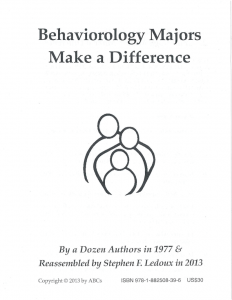
Table of Contents and More Information (PDF)
This book contains ten papers by student authors on the meaningful applied research projects that they conducted, as part of their coursework, to help someone they knew solve a behavior problem. In 2013 Stephen Ledoux reassembled these papers, which were authored by some of his best students in Australia (two at the University of Queensland and eight at Gippsland Institute of Advanced Education). He reassembled them from parts of a larger out–of–print book first published in 1977 in Australia. These papers enable today’s students to see the kind of work of which they too are capable. This 115–page book (ISBN 978-1-882508-39-6) lists for $40.
You can obtain a “Print–On–Demand” copy of this book for about $18 from www.lulu.com (click the magnifying glass icon and enter the author’s name to get to the book).
Direct Book Service will likely answer the phone with “Dogwise,” because their most popular specialty involves books about our canine friends. You can also order at their website (www.dogwise.com). Electronic versions are available.
For the copies that it has, Dogwise.com ALWAYS has the guaranteed lowest authorized price, AND they may still have some copies of various hardcover editions of some behaviorology books for the same or lower authorized price as the newer softcover editions now available on Lulu.com.
The Science and Technology of Dog Training Second Edition (2017)
by James O’Heare, DLBC
Softcover (2017), 6 x 9”, 310 pages
Table of Contents and More Information (PDF)
The Science and Technology of Dog Training is a manual for both students of dog training and established professionals, presenting basic through to advanced principles, strategies, and techniques in non-coercive dog training. No fads or proprietary “one–true–way” “systems.” …Dog Training… introduces the natural science of behavior, its principles, and the technology of behavior engineering derived from it. It covers all of the foundational behaviors with instructions from preliminaries right through to maintenance and also advanced training procedures such as shaping and behavior chaining for complex behaviors. …Dog Training… presents an errorless added reinforcement–emphasized approach. This …Second Edition is completely reworked and includes a new chapter on training humans. Dog Training is treated like a self–study course in a book, providing a list of detailed behavior objectives for each chapter as well as exercises trainers can use to develop and expand their repertoire of effective training behaviors.
To obtain a copy, call the main distributor, Direct Book Service, Inc., at 800–776–2665. The company will likely answer the phone with “Dogwise,” because their most popular specialty involves books about our canine friends.
For a short biography of the author, click HERE.
Aggressive Behavior in Dogs: A Comprehensive Technical Manual Third Edition (2017)
by James O’Heare, DLBC
Softcover (2017), 8.5 x 11”, 235 pages
Table of Contents and More Information (PDF)
Aggressive Behavior in Dogs is a comprehensive technical manual, written for animal behavior professionals. It outlines why dogs aggress, how technologists can manage aggressive behavior cases from initial contact through the functional behavioral assessment process, establishing behavior objectives, designing, and implementing a systematic contingency management plan and working toward resolution from a behaviorological natural–science orientation. Although the content relates to dogs, it could be applied to various species of companion animal. This …Third Edition has been completely revamped and updated.
To obtain a copy, call the main distributor, Direct Book Service, Inc., at 800–776–2665. The company will likely answer the phone with “Dogwise,” because their most popular specialty involves books about our canine friends.
For a short biography of the author, click HERE.
Training Dogs—A Dogs–Owner’s Guide to the Science of Behavior and Non–Coercive Dog Training (2017)
by James O’Heare, DLBC
Softcover (2017), 6 x 9”, 98 pages
Table of Contents and More Information (PDF)
Training Dogs…, which is the first book in the “Dog Behavior” series, is a dog–owner’s guide to the basic principles, strategies, tactics, and practices in non–coercive dog training to promote a mutually reinforcing relationship and a harmonious household. It provides an accessible, yet scientifically accurate, exploration of the most current and powerful non–coercive practices people can use in everyday life to improve the behavioral well being of dogs and themselves. Training Dogs… will emphasize (a) training at all times rather than in scheduled sessions, and (b) basic principles and strategies rather than just step–by–step instructions alone, so that dog owners may develop the knowledge and skill to train any behavior they wish.
To obtain a copy, call the main distributor, Direct Book Service, Inc., at 800–776–2665. The company will likely answer the phone with “Dogwise,” because their most popular specialty involves books about our canine friends.
For a short biography of the author, click HERE.
Problem Animal Behavior—Functional Assessment and Constructive Contingency Management Planning (2016)
by James O’Heare, DLBC
Softcover (2016), 8.5 x 11”, 238 pages
Table of Contents and More Information (PDF)
Problem Animal Behavior… is an essential textbook providing detailed coverage of the functional assessment of problem animal behavior and the design and implementation of constructional contingency management plans. It introduces the natural science of behavior and the basic laws and principles of behavior. It places a strong emphasis on constructional positive reinforcement–based methods throughout. The strategies and procedures are applicable to all species. Functional assessment forms are provided for the reader’s use.
To obtain a copy, call the main distributor, Direct Book Service, Inc., at 800–776–2665. The company will likely answer the phone with “Dogwise,” because their most popular specialty involves books about our canine friends.
For a short biography of the author, click HERE.
The Science and Technology of Animal Training (2014)
Table of Contents and More Information (PDF)
In 2014, BehaveTech Publishing, Ottawa Canada, published another applied–behaviorology book by James O’Heare. With the title, The Science and Technology of Animal Training, O’Heare expands his earlier dog–training book to cover several additional species, namely cats, birds, horses and, yes, humans, because the book is about training humans to train their companion animals. This longer soft cover book contains extended coverage of similar topics. The book builds mastery of advanced techniques for training more complex behaviors, and would be a good reference for established professional trainers as well as for those becoming skilled professionals. This book can be obtained from Dogwise at 800–776–2665. You can also order at their website (www.dogwise.com) or the other usual online sources.
For a short biography of the author, click HERE
Behaviorological Rehabilitation and the Criminal Justice System (2013)
Table of Contents and More Information (PDF, 93KB)
In January 2013 ABCs of Canton NY published the 190–page book, Behaviorological Rehabilitation and the Criminal Justice System, by Lawrence Fraley (ISBN 978-1-882508-20-4). While this hard–cover book lists for $80, a limited number of copies are on special sale for $60. You can order one of these copies by calling the main distributor, Direct Book Service, Inc., at 800–776–2665. The company will likely answer the phone with “Dogwise,” because their most popular specialty involves books about our canine friends. You might also order at their website (www.dogwise.com). In the future a soft–cover edition will likely be priced between $56 and $59.
For a short biography of the author, click HERE.
Back Cover Text: Over the last century, a comprehensive natural science of human behavior has developed. However, that science emerged within a human culture that, since antiquity, has been heavily invested in organized superstitious and mystical alternatives with respect to behavioral phenomena. As a result the natural science of behavior remains largely absent from academic curricula. Few people are thus prepared to study and manage human behavior through this natural science, although doing so would lead expeditiously to solutions for seemingly intractable socio-cultural problems. From this natural science perspective, this book offers a preview of such outcomes by revisiting just one aspect of culture, namely, law and the criminal-justice system. The often-radical differences from traditional practice that emerge in this book reveal how an appropriate natural science can bring a satisfactory end to some long cultural frustrations. The new basic behavior science, along with the naturalistic philosophical foundations that inform it, is known as Behaviorology.
Dignified Dying – A Behaviorological Thanatology (2012)
Table of Contents and More Information (PDF, 150KB)
In January 2012 ABCs of Canton NY published the 180–page book, Dignified Dying—A Behaviorological Thanatology, by Lawrence Fraley (ISBN 978-1-882508-16-7). While this hard–cover book lists for $80, a limited number of copies are on special sale for $60. You can order one of these copies by calling the main distributor, Direct Book Service, Inc., at 800–776–2665. The company will likely answer the phone with “Dogwise,” because their most popular specialty involves books about our canine friends. You might also order at their website (www.dogwise.com). In the future a soft–cover edition will likely be priced between $56 and $59.
The publisher issued a brief errata sheet for copies of the first printing of this book. You can find that sheet HERE.
For a short biography of the author, click HERE.
Back Cover Text: Behaviorological Thanatology reveals how behaviorology, the natural science of human behavior, enables a powerful new conceptualization of death and dying. It is especially relevant to episodes of protracted dying. This book analyzes the unnecessary mistreatment that our traditional cultural practices visit on both the dying and their survivors, and develops new scientifically grounded cultural practices for the conduct of the dying and their survivors, practices that not only avoid abuse but also increase dignity.
General Behaviorology – The Natural Science of Human Behavior (2008)
Table of Contents and More Information (PDF, 249KB)
By January 2008 ABCs of Canton NY had published the 1,600–page, three–course textbook, General Behaviorology —The Natural Science of Human Behavior, by Lawrence Fraley. While this book lists for $120 and can be ordered from the store at www.behavior.org (the website of the Cambridge Center for Behavioral Studies), you can still get an autographed copy directly from the author by first contacting him by email (at lfraley@citlink.net) or phone (at 304-864-6888) to arrange payment and shipping.
For a short biography of the author, click HERE.
The publisher issued a brief errata sheet for copies of the first printing of this book. You can find that sheet HERE.
Grandpa Fred’s Baby Tender OR Why and How we Built our Aircribs (1987)
Table of Contents and More Information (PDF)
The publisher of the 1987 book, Grandpa Fred’s Baby Tender OR Why and How we Built our Aircribs, by Stephen Ledoux and Carl Cheney, has donated this book to TIBI so that the book could be available for free electronic distribution. This book describes in detail the steps and materials that the authors used to build the aircribs that their children used. Since neither author is a professional carpenter, they thought that sharing these details could show others who were interested that they too are capable of building themselves an aircrib. While originally typed on an IBM–Selectric typewriter, the book is about 32MB in this PDF version, and is the only version now available (as the original softcover edition went out of print some years ago). Furthermore, this PDF version contains five never–before–published photos of one of the aircribs that the authors built. The book also contains the short article, “The First Baby Tender,” by B. F. Skinner, which was written as the Foreword for this volume. THIS COMPLETE BOOK IS AVAILABLE HERE FOR FREE AS A PDF.
Click HERE to download the complete PDF book.
Click HERE to access the Foreword to the book.
Click HERE to look at just the photos from book.
Origins and Components of Behaviorology – Second Edition (2002)
Table of Contents and More Information (PDF, 130KB)
For a short biography of the author, click HERE.
By January 2002 ABCs of Canton NY had published the 390–page book, Origins and Components of Behaviorology—Second Edition, by Stephen Ledoux (and the other founders of TIBI). This book lists for $95 and can be ordered from the store at www.behavior.org (the web site of the Cambridge Center for Behavioral Studies).
The Panda and Monkey King Christmas—A Family’s Year in China (1997)
Table of Contents and More Information
(1997) The Panda and Monkey King Christmas—A Family’s Year in China by Nelly Case and Stephen Ledoux. As described in the “Front Matter” for this book (in the Table of Contents link above) this book describes the events and adventures that the authors’ had while teaching in China as university faculty exchange professors for a year with their then five–year–old son. Those events and adventures included the university accepting the teaching—by a behaviorologist—of behaviorology courses, possibly for the first time anywhere explicitly under that disciplinary label, at both the undergraduate and graduate levels.
You can obtain a “Print–On–Demand” copy of this 200–page book (ISBN 978–1–882508–10–5) for about $25 from www.lulu.com (click the magnifying glass icon and enter the author’s name to get to the book).
An artless electronic version may be available at Direct Book Service, Inc., at 800– 776–2665 who will likely answer the phone with “Dogwise,” because their most popular specialty involves books about our canine friends. You can also order at their website (www.dogwise.com).
For the copies that it has, Dogwise.com ALWAYS has the guaranteed lowest authorized price, AND they may still have some copies of various hardcover editions of some behaviorology books for the same or lower authorized price as the newer softcover editions now available on Lulu.com.
For a short biography of the author, click HERE.




